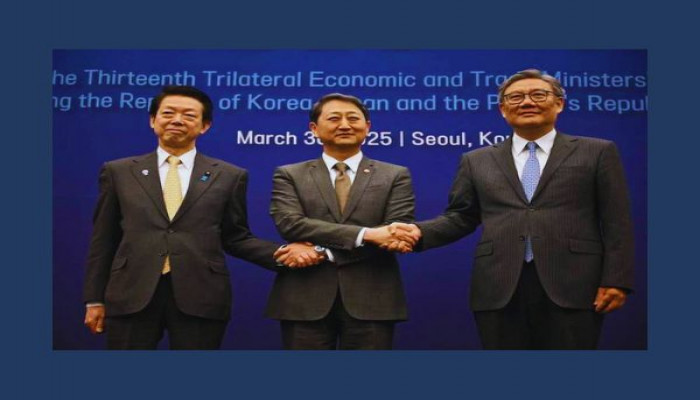China, Japan, South Korea strengthen trade ties amid looming Trump tariffs
- In Reports
- 11:42 PM, Mar 31, 2025
- Myind Staff
South Korea, China, and Japan have resumed economic dialogue for the first time in five years, aiming to boost regional trade as they prepare for potential economic disruptions from new U.S. tariffs. The trilateral meeting took place in Seoul on Sunday, ahead of U.S. President Donald Trump’s expected tariff announcement on April 2, which he has referred to as "liberation day" while reshaping Washington’s trade policies.
Commitment to Regional Trade and Cooperation
During the 13th Trilateral Economic and Trade Ministers’ Meeting, the trade ministers of the three nations committed to "closely cooperating for a comprehensive and high-level" discussion on a potential free trade agreement (FTA) among South Korea, Japan, and China. They emphasised the importance of fostering "regional and global trade," according to a joint statement released after the discussions.
South Korean Trade Minister Ahn Duk-geun highlighted the necessity of strengthening the Regional Comprehensive Economic Partnership (RCEP), which includes all three countries. "It is necessary to strengthen the implementation of RCEP, in which all three countries have participated, and to create a framework for expanding trade cooperation among the three countries through Korea-China-Japan FTA negotiations," he stated.
Context: Growing Trade Tensions with the U.S.
The meeting occurred as Trump prepares to announce a new wave of tariffs, further altering U.S. trade relationships. Recent tensions have already impacted global trade, and his latest measures are expected to target key industries.
Despite being major trading partners of the United States, South Korea, China, and Japan have faced conflicts among themselves over issues such as territorial disputes and Japan’s controversial release of wastewater from the Fukushima nuclear plant. Talks for a trilateral free trade deal, initiated in 2012, have seen little progress.
RCEP and Auto Industry Concerns
RCEP, which came into effect in 2022, is designed to reduce trade barriers among 15 Asia-Pacific nations, providing a framework for economic integration in the region. The ministers emphasised the importance of maintaining the stability of this trade pact.
Trump’s recent announcement of a 25% import tariff on cars and auto parts has raised concerns, particularly for Asian automakers, who are among the largest vehicle exporters to the U.S. According to S&P data, after Mexico, South Korea is the second-largest exporter of vehicles to the United States, followed by Japan. The new tariffs could significantly impact their auto industries.
Next Meeting in Japan
The ministers agreed to continue their economic discussions and scheduled their next trilateral meeting to take place in Japan. With mounting trade uncertainties, the three nations aim to solidify regional economic ties and explore new avenues for cooperation amid shifting global trade policies.







Comments